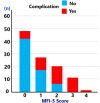The prognostic significance of modified frailty index-5 in patients undergoing pneumonectomy for lung cancer
- PMID: 39475437
- PMCID: PMC11557900
- DOI: 10.1093/icvts/ivae179
The prognostic significance of modified frailty index-5 in patients undergoing pneumonectomy for lung cancer
Abstract
Objectives: In some centrally located lung cancers, complete excision of the mass cannot be achieved with parenchymal-sparing procedures and pneumonectomy may be required. The mortality and morbidity rates of pneumonectomy were reported to be considerably high. Here, we investigated the effectivity of modified frailty index-5 (MFI-5) in patients undergoing pneumonectomy for non-small cell lung cancer.
Methods: Data of patients who underwent pneumonectomy for non-small cell lung cancer between January 2018 and December 2023 were reviewed retrospectively. The MFI-5 score was determined by preoperative diabetes mellitus, hypertension, chronic obstructive pulmonary diseases, congestive heart failure and functional status. The effectiveness of the MFI-5 score for the presence of postoperative major complications and 30-day mortality was investigated by multivariate logistic regression analysis. A P-value <0.05 was considered statistically significant.
Results: A total of 107 patients who met the inclusion criteria were included in the study. Eight (7.5%) of patients were female, and the mean age was 61.4 ± 8.7. The MFI-5 score was 0 in 48 patients (44.9%), 1 in 27 patients (25.2%) and 2 in 20 patients (18.7%). Postoperative 30-day mortality was detected in 4 patients (3.7%), and the major complications occurred in 42 patients (39.3%). In multivariate analysis, an MFI-5 score of 2 or higher (P = 0.008, OR: 4.9) was statistically significant for complications, whereas age, gender, side of the operation, <2 MFI-5 score, tumor diameter, type of surgery and lymph node metastasis status were not statistically significant (P > 0.05).
Conclusions: The MFI-5 score is a significant indicator for predicting major postoperative events in patients who underwent pneumonectomy for non-small cell lung cancer.
Clinical registration number: 2024-323, approved by Gazi University Local Ethics Committee.
Keywords: Lung cancer; Modified frailty index-5; Pneumonectomy; Prognosis.
© The Author(s) 2024. Published by Oxford University Press on behalf of the European Association for Cardio-Thoracic Surgery.
Figures




References
-
- Socinski MA, Obasaju C, Gandara D, Hirsch FR, Bonomi P, Bunn P et al Clinicopathologic features of advanced squamous NSCLC. J Thorac Oncol 2016;11:1411–22. - PubMed
-
- Thomas PA. Pneumonectomy following induction therapy: an evidence-based, experienced-based and eloquence-based point of view. Eur J Cardiothorac Surg 2012;41:886–7. - PubMed
-
- Fried LP, Tangen CM, Walston J, Newman AB, Hirsch C, Gottdiener J et al; Cardiovascular Health Study Collaborative Research Group. Frailty in older adults: evidence for a phenotype. J Gerontol A Biol Sci Med Sci 2001;56:M146–56. - PubMed
-
- Wada H, Suzuki H, Sakairi Y, Tanaka K, Sata Y, Toyoda T et al Can modified frailty index predict postoperative complication after lung cancer surgery? Gen Thorac Cardiovasc Surg 2024;72:176–82. - PubMed
LinkOut - more resources
Full Text Sources
Miscellaneous

